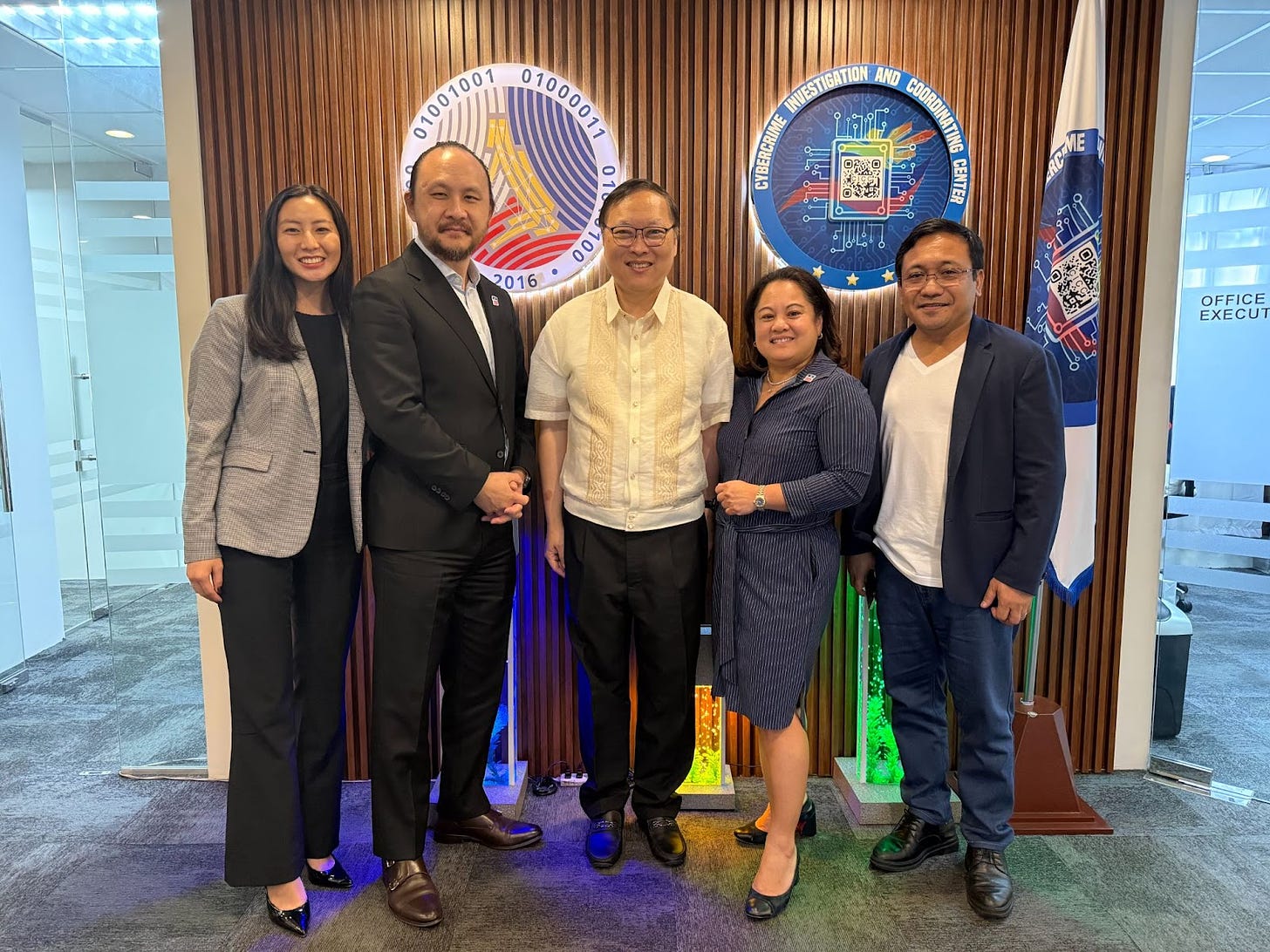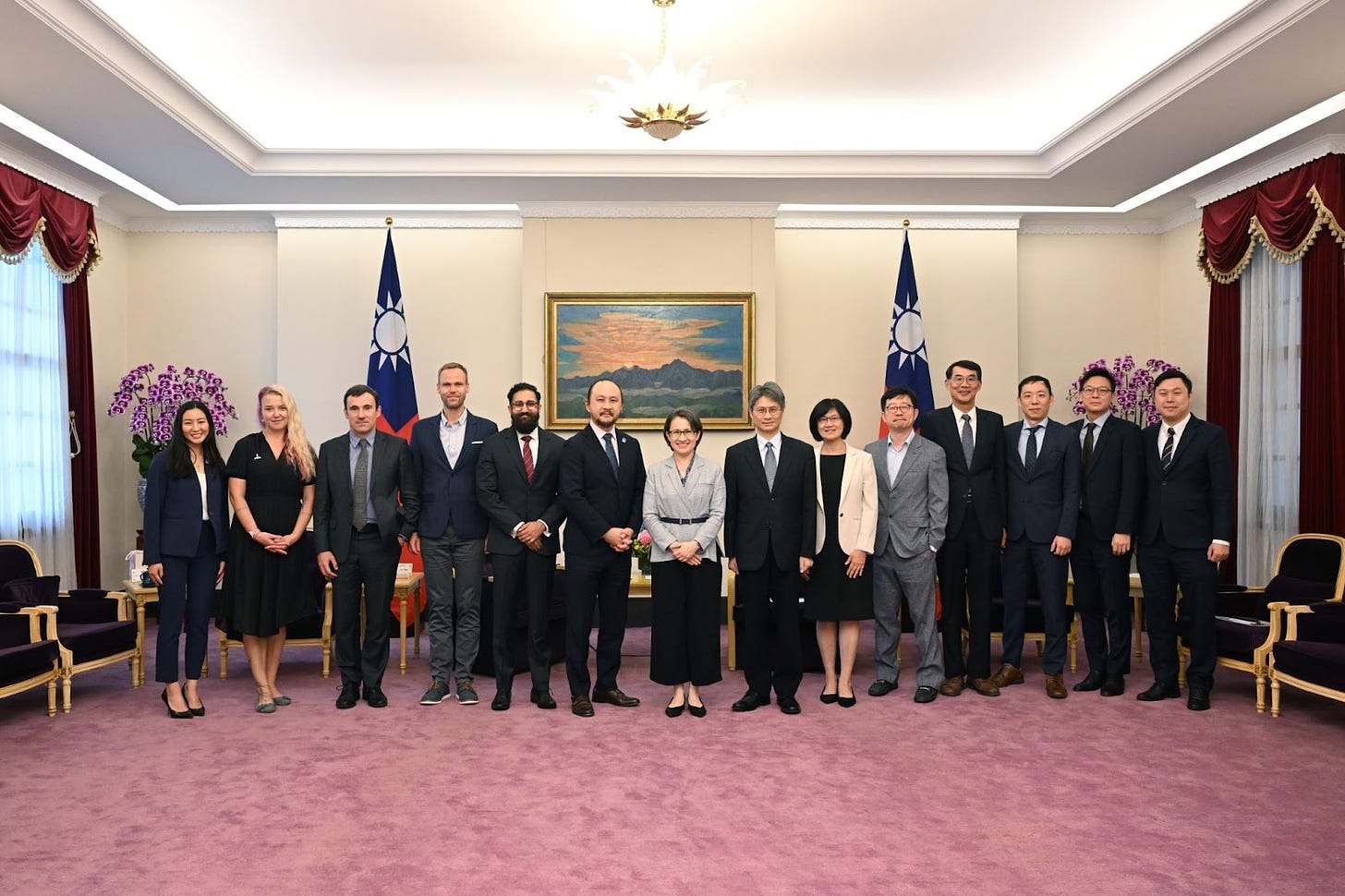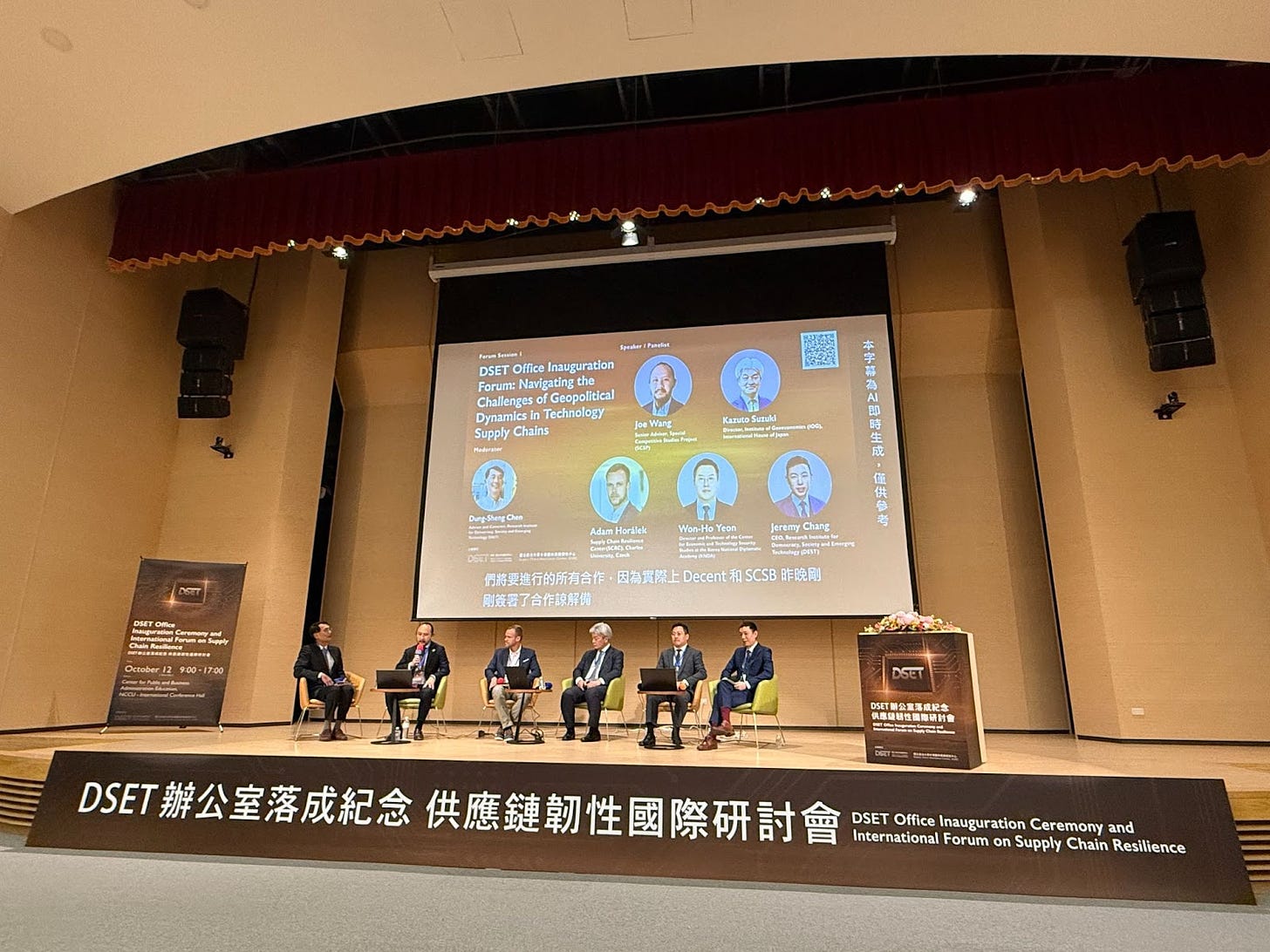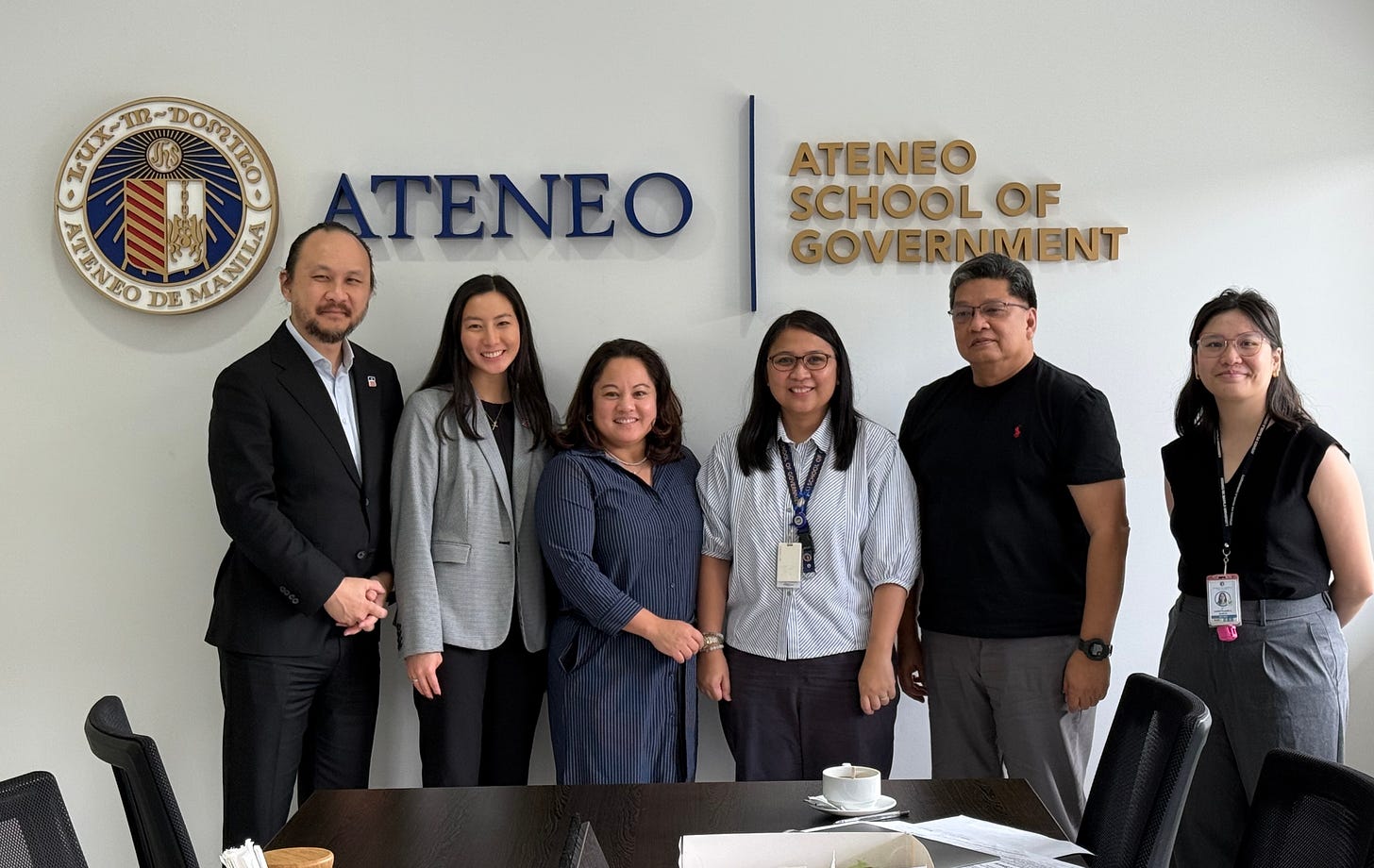Hello, I’m Ylli Bajraktari, CEO of the Special Competitive Studies Project. In this edition of SCSP’s newsletter, the Foreign Policy Panel’s Joe Wang and Channing Lee reflect on key insights from their recent visits to the Philippines and Taiwan.
Two Island Nations, From Neighbors to Partners
Both the Philippines and Taiwan face significant threats from the People’s Republic of China (PRC). During our visit, SCSP held discussions with leaders across government, industry, academia, and civil society to grasp first-hand the opportunities and challenges facing them both. It became clear that these two nations have practical imperatives to strengthen ties – not only to fortify their democracies but also to confront the shared challenges posed by the PRC.
An Archipelagic Challenge for Digitalization
With an average age of 25, the Philippines is a youthful and dynamic country eager to adopt new technologies. Its journey toward digitalization has not been easy, hindered by its geography – over 7,600 islands – and issues with internet connectivity and tech affordability. However, under President Ferdinand Marcos Jr., the country has made remarkable strides in improving the country’s digital infrastructure and pushing for increased international tech investment.
In June 2023, the Department of Information and Communications Technology (DICT) launched an e-Government platform, including an e-Gov Super App, which streamlines government services, boosts transparency, and promotes societal digitalization. With more than 6 million downloads, the app reflects growing public trust in government institutions, with one senior ICT official likening it to a “highway” for public data.
A year later, the DICT and the Philippine Statistics Authority (PSA) introduced a digital version of the country’s National ID, accessible via the e-Gov super app, along with e-verify authentication platforms. Known as ePhilID, this digital ID now serves as a valid proof of identity for government and private transactions. All 87 million Filipinos who hold a national ID – and future users who choose to sign up for one – can utilize this service, which once more showcases the government’s commitment to delivering secure, efficient, and reliable digital services for its people.

President Marcos has also established an Office of the Special Assistant to the President for Investment and Economic Affairs (OSAPIEA) to coordinate economic growth across the government, aiming to position the Philippines as a prime destination for investment in Asia. Technology lies at the heart of many of these investments that Manila seeks to attract, from data centers to semiconductor fabs.
Despite these advances, Filipino scientists, engineers, and researchers are working hard to develop their tech capabilities. During a meeting with the Department of Science and Technology (DOST), Department of National Defense (DND), and Department of Foreign Affairs (DFA), we learned about the various AI projects that government-backed researchers are developing. iTANONG is a natural language querying engine available in Filipino, English, and Taglish, and other research projects facilitated the fusion of AI with agriculture and an intelligent traffic controller unit with wireless communication capability. These efforts have propelled the Philippines to 10th place in East Asia in government AI readiness.
Private sector companies and civil society are also stepping up to serve their communities. We had the unique opportunity to meet with several leaders of Gabay Guro, a non-profit organization funded by some of the Philippines’ largest companies, dedicated to supporting teachers across the country. Entirely run by volunteers, Gabay Guro trains, equips, and empowers teachers in their mission to educate the next generation of Filipinos – and has already trained 1 million teachers. They have begun rolling out technology platforms to enhance their work, including an app featuring a parent-teacher portal, lesson plan resources, and opportunities for earning badges by achieving various milestones. Additionally, Gabay Guro has provided satellite internet connections, enabling teachers and local communities to access online educational resources. In collaboration with the Philippines Department of Education, Gabay Guro exemplifies how public-private partnerships can successfully drive technology adoption, especially in developing nations.
Heightened Tensions in the West Philippine Sea
While we in Washington worry about the PRC’s long-term military ambitions, Filipino fishermen directly confront PRC hostilities on a daily basis – and some have begun recording the incidents to show the world what is happening in the disputed waters. From firing water cannons to directly ramming Philippine vessels, People’s Liberation Army Coast Guard harassment of Philippine fishing boats has escalated. One Philippine sailor even lost a thumb. President Marcos warned any Philippine death, military or civilian, could constitute an “act of war.”
For the United States, a treaty ally of the Philippines, these tensions may be the flash point for a broader conflict. This makes it vital for U.S. leadership to bolster Philippine defense capabilities and coordinate like-minded allies to deter PRC aggression. After cozying up to China during the Duterte administration, the Philippines has reinvigorated its alliance with the United States, seeking greater support from us and our allies and partners to defend its territorial integrity, as well as a better understanding of the changing landscape of warfare to deter further aggression.
The Philippines’ reliance on traditional naval and air capabilities, purchased from the United States, may not be sufficient to counter the PRC’s superior numbers. As the world studies the Ukraine conflict, the Philippines can likewise glean lessons as a smaller nation facing a larger adversary. Government capabilities on cybersecurity to ensure infrastructure resilience will be key. Managing the disinformation environment will be critical. And leveraging autonomous systems on the battlefield can offset an opponent’s advantages in traditional military capabilities.
As one senior Defense Department official told us, resisting the PRC’s encroachment in Philippine waters, politics, society, and economics is at its core a fight to preserve the Philippines’ identity.
The Ateneo School of Government, a premier higher education institution that caters to civil servants, is integrating critical lessons learned in the evolving environment around technology and warfare to train the next generation of Philippine policymakers and military personnel on these issues.
The Critical Island 100 Miles North
As Joe explained last week, Taiwan is acutely aware of the threat across the Strait and has mobilized a whole-of-society approach to strengthen its resilience. After visiting Manila, our team returned to Taipei to participate in the inaugural event of the new Research Institute for Democracy, Society, and Emerging Technology (DSET) on “Navigating the Challenges of Geopolitical Dynamics in Technology Supply Chains.” Sponsored by Taiwan’s National Science and Technology Council, DSET works at the intersection of geopolitics and technology to offer recommendations on promoting Taiwan’s tech ecosystem around democracy, inclusiveness, sustainability, resilience, and innovation to guide its technological development, emphasizing the superiority of democracy. SCSP signed a Memorandum of Understanding with DSET to solidify our two organizations’ partnership – congratulations to our DSET friends on their new office space and a successful event!
When it comes to the global, democratic technology ecosystem – from critical minerals to manufacturing facilities to talent and everything in between – there is much Taiwan can do to help the United States and its allies and partners secure global supply chains and safeguard our economic security.

Vice President Bi-Khim Hsiao graciously met with the international delegation attending the DSET event and impressed upon us the important role Taiwan can play as a trusted – and competitive – partner for its manufacturing needs. Indeed, the world trusts Taiwan to supply safe, secure, and high-quality technology (including and beyond semiconductors), which makes the island irreplaceable and indispensable for global markets. A fun discovery for our team was Gogoro – an electric scooter company whose battery-swapping technology is reimagining how vehicles consume fuel and energy. Given its advantage in hardware, Taiwan is now focused on developing its software capabilities, particularly in artificial intelligence (President Lai has called for turning Taiwan into an “AI Island”) and cybersecurity.
To that end, we reconnected with our friend Audrey Tang, former Minister of Digital Affairs who recently was named Taiwan’s Ambassador-at-large for Cyber. Taiwan has been a global pioneer in cybersecurity methods – its trinity of Ministry of Digital Affairs (moda), Administration of Cyber Security (ACS), and National Institute of Cyber Security (NICS) work in tandem to set policy objectives, implement cybersecurity policy, and advise on application and R&D, respectively.
National Security is Supply Chain Security
New organizations like DSET are filling key voids of thought leadership when it comes to topics of economic and national security.

The DSET event, which featured representatives from the United States, the Republic of Korea, Japan, Singapore, Czechia, France, and Taiwan, underscored a growing global consensus: the world increasingly understands that national security is economic security, but we must also embrace the notion that national security must also be supply chain security. As countries face PRC coercion, we must explore new fora of cooperation to secure our technology ecosystems, draw upon the comparative advantages that each partner brings to the table, and work together to ensure our supply chain security and resilience.
Natural Partners in the Face of PRC Aggression
While the Philippines and Taiwan differ in culture, demographics, development, and history, they share a common adversary: the PRC. Both nations also maintain strong partnerships with the United States. Our trip to both countries underscored the urgency for greater cooperation between the two to face their mutual threat. The United States can facilitate this partnership, especially in scaling critical technology capabilities like autonomous systems that will be essential for collective defense.
For example, both countries will need to bolster their asymmetric capabilities to overcome their larger adversary, whose arsenal of over 3,000 aircraft, nearly 400 vessels (including aircraft carriers and submarines), and 2 million active-duty forces are no match for the Armed Forces of the Philippines nor Republic of China Armed Forces. Philippine seamen are already experimenting with unmanned systems for surveillance and patrol, but such capabilities require scaling to become effective mechanisms of deterrence and defense.
Though historical market forces have not brought Taiwan and the Philippines together, today’s geopolitical landscape demands deeper economic, military, and social ties. From technology cooperation to shared democratic values to similar relations with the United States, there is a solid foundation for these two nations to work together in safeguarding regional security.
📌 SCSP Events on the Horizon
October 23 - SCSP’s second AI+ summit, the AI+ Robotics Summit, will take place in Washington, D.C. Sign up for our waitlist here!
November 1 - The Ash Carter Exchange in Boston, MA. Join the waitlist here!
November 15 - SCSP x AGI House Hackathon: SCSP is partnering with the Bay Area AI hacker house, AGI House, to host an AI Agents for Gov Hackathon at SCSP’s office in DC. Come create the future of AI agents to solve important real-world challenges. Stay tuned for more details!









Gogoro (from Taiwan) and its battery swapping tech might be facing a very hard challenge this year given their performance in both the capital and local market. GGR (NASDAQ) US$0.58 0.00. The "trinity" of MODA, ACS and NICS also doesn't work quite as portrayed in the article. ACS and NICS are both subordinate organs of MODA.
Hello Ylli. Thanks for your highlights on "Two Island Nations, From Neighbors to Partners". Since 2019 the US (and recently UK and Canada) have been actively engaged in security efforts in the Asia-Pacific region. To assuage the broader geopolitical interests in this area. The USCAI recommendations are also noteworthy in this context. Glad to chat further, kindly DM me at then. Thanks